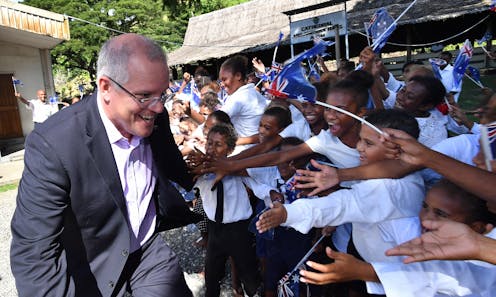Australia is spending less on diplomacy than ever before – and its influence is suffering as a result
- Written by Melissa Conley Tyler, Director of Diplomacy at Asialink, University of Melbourne

Ten years ago, the Lowy Institute published a report on the state of Australia’s diplomatic capacity that painted a “sobering picture” of overstretched foreign missions and declining resources.
In the words of then-Prime Minister Kevin Rudd, who was quoted in the report:
Given the vast continent we occupy, the small population we have and our unique geo-strategic circumstances, our diplomacy must be the best in the world.
However, since then we haven’t put enough resources into our diplomacy as we should. New research by Asialink at the University of Melbourne published in Australian Foreign Affairs shows continuing under-investment in Australia’s diplomatic capacity, with funding for the Department of Foreign Affairs and Trade (DFAT) now at a new low of just 1.3% of the federal budget.
Still in deficit?
According to Allan Gyngell, the founding director of the Lowy Institute, the reason for its 2009 report, Diplomatic Deficit, was simple.
For Australia to do things in the world, it needs a number of assets. These include the instruments of foreign policy, including the overseas network of posts.
The idea for the report was to go beyond the usual suspects and involve people like business leaders in making the case for diplomacy. It made 24 recommendations, many of which were not specifically about funding. These have mostly been met.
Sadly, the situation is less positive for recommendations that called for additional funding. Since 2013, Australia’s total diplomatic, trade and aid budgets have fallen from 1.5% of the federal budget to 1.3%. In pure dollar terms, this is a fall from A$8.3 billion to A$6.7 billion.
At the same time, the budgets for defence, intelligence and security have ballooned. In the almost two decades since the September 11 terror attacks, the Department of Defence budget has increased by 291%, while the allocation for the Australian Security Intelligence Organisation has grown by 528% and the Australian Secret Intelligence Service by 578%.
Read more: Methodology: finding the numbers on Australia's foreign aid spending over time
Lost opportunities
This systematic under-funding of DFAT has run down Australia’s diplomatic capacity to the point that it is under-resourced to confront current foreign policy challenges.
To give an idea of what this means, these are some examples of what Australia’s diplomats do on a day-to-day basis:
consular work assisting Australians in trouble with law enforcement, such as visiting them in prison and advocating for fair treatment
counter-terrorism cooperation, working with overseas governments to build capacity and help keep Australian travellers safer
business promotion of Australian products and services and investment promotion for companies considering setting up operations in Australia
networking with influential politicians and business people to try to impact decisions that will affect Australians.
When Australia’s diplomats are asked to accomplish more with fewer resources, they have to cut back what they can do.
Read more: As Australia's soft power in the Pacific fades, China's voice gets louder
Scaling back has a real effect on Australia’s influence. If Australia reduces the scholarships to bring future regional leaders to study in Australia, for instance, they’ll likely study and form bonds elsewhere.
If Australia reduces its investment in Indonesia’s education system, it will be dominated by the country’s other major funder, Saudi Arabia.
When Australia pulls back on its diplomacy, other countries take up the slack.
One impetus for the Morrison government’s much-vaunted “Pacific Step Up” was the realisation that cuts in aid and diplomacy had led to lessened Australian influence in its neighbourhood. In the words of one diplomat I spoke to, “China had been eating our lunch”.
The problem is that the “step up” did not come with increased funding for diplomats, meaning that DFAT’s new Office of the Pacific is being formed by taking staff and resources from other parts of department.
Getting back in black
We recommend an immediate increase in spending on diplomacy, trade and aid to 1.5% of the federal budget. This is closer to the spending of countries such as Canada (1.9%) and the Netherlands (4.3%), though still much lower than the challenging era after the second world war, when Australia was spending 9% of the federal budget on diplomacy, trade and aid.
If nothing else, DFAT should be granted an exemption from the efficiency dividend – an annual funding reduction for government agencies – until its budget rises to a more normal, historical level. This measure, usually levied at 1% to 1.25% of the administrative budget, reached 4% in 2012–13. With DFAT cut to the bone, the focus should be on increasing its budget, not constant cuts.
Read more: Next government must find Australia's place in a turbulent and rapidly changing world
The aspirations for our diplomacy must be upgraded beyond the bare minimum. Ten years on from Diplomatic Deficit, Australia must resist the magical thinking that foreign affairs and trade somehow happen by themselves. In the 2009 report, former DFAT Secretary Richard Woolcott is quoted as saying:
I do feel that the Department of Foreign Affairs … has been allowed to run down to a dangerously low level … we can’t go on doing more with less … these sorts of undertakings do need to be properly resourced.
If only this had changed in the last 10 years.
Mitchell Vandewerdt-Holman, a Master of International Relations student at the University of Melbourne, contributed to this report.
Authors: Melissa Conley Tyler, Director of Diplomacy at Asialink, University of Melbourne



















